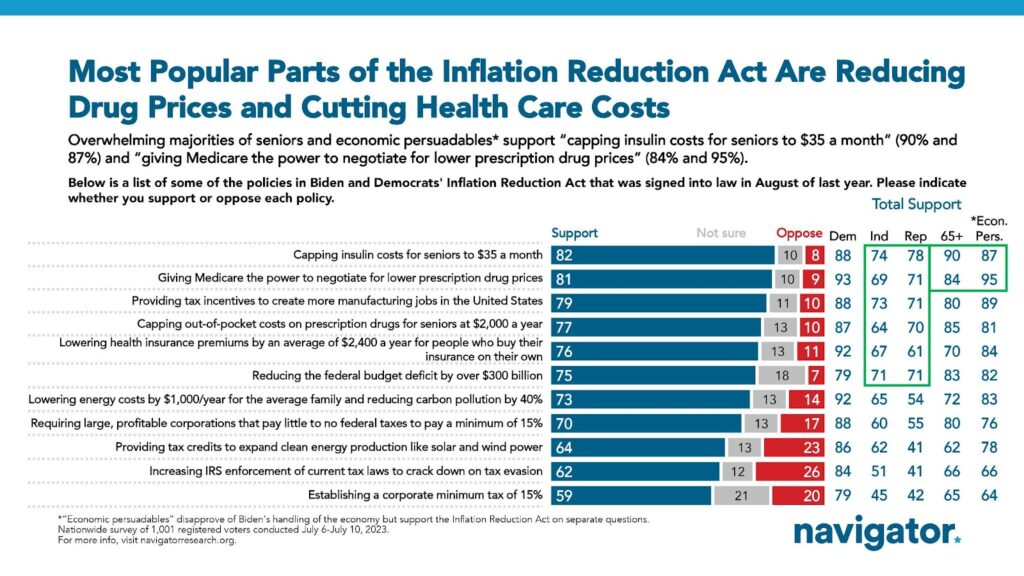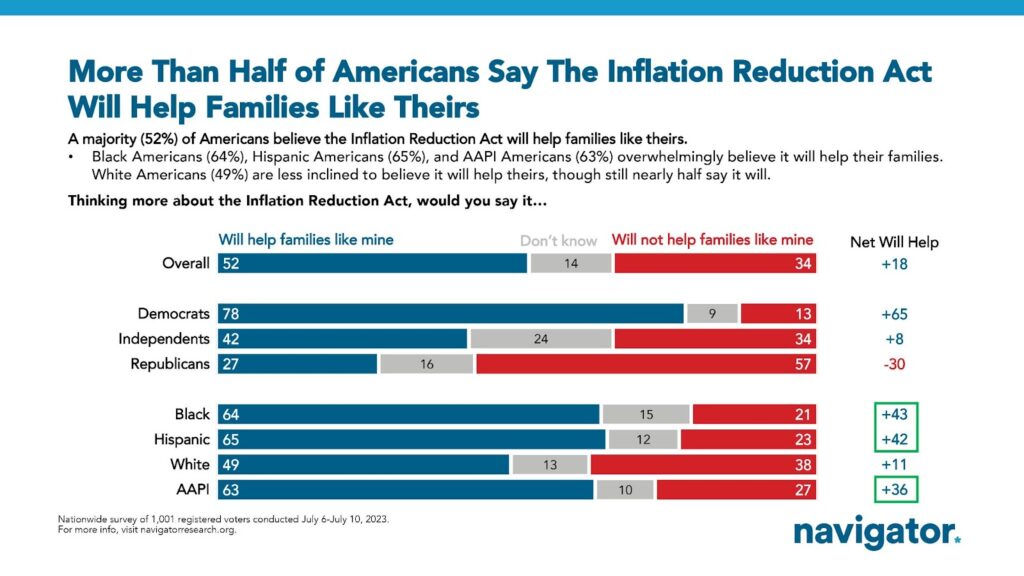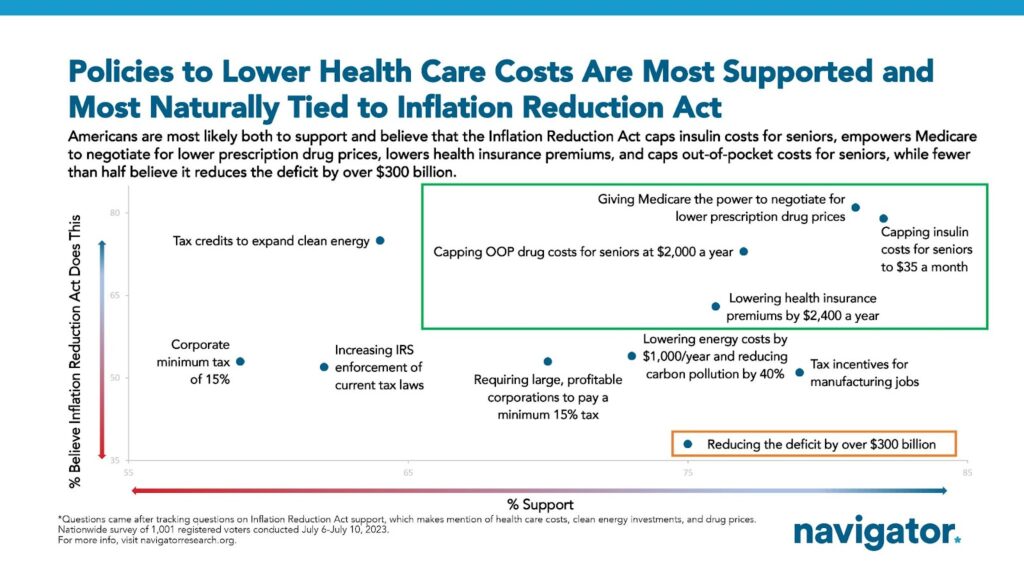August 16 marks the one-year anniversary of the Inflation Reduction Act, and there is so much to celebrate. Between lowering premium costs for families by $2,400 on average, capping insulin costs, and stopping drug companies’ egregious price hikes, the new legislation is already working for the American people. Soon, seniors’ drug costs will be capped at $2,000 annually, and Medicare will finally be able to negotiate lower drug prices.
It is increasingly clear how deeply the public supports the Inflation Reduction Act — and especially its health care elements. Polling continues to show that the Inflation Reduction Act’s health care provisions are the most supported measures in the entire bill, driving the law’s overall popularity across parties. Over 80 percent of voters support the Inflation Reduction Act’s prescription drug negotiation program. At the same time, voters overwhelmingly reject the GOP war on health care, including Republicans’ plan to repeal the Inflation Reduction Act’s prescription drug pricing measures.
The Inflation Reduction Act comes as Americans are still struggling to afford their medications. According to a July 2023 KFF poll, nearly 30 percent of adults have reported difficulty affording prescription drugs, with another three in ten adults reporting not taking their medicine as prescribed in the past year due to the cost. Lower-income adults are more likely than those with higher household incomes to report experiencing these cost-related prescription drug issues. Provisions in the Inflation Reduction Act decrease the cost of prescription drugs and put the power back in the hands of Americans.
NAVIGATOR
Voters Overwhelmingly Support The Inflation Reduction Act’s Measures To Reduce Prescription Drug And Health Care Costs. According to a new Navigator poll, health care provisions in the Inflation Reduction Act are 4 of the 5 most popular items in the landmark bill. An overwhelming 82 percent of voters support capping insulin costs for seniors to $35 per prescription a month, 81 percent support giving Medicare the power to negotiate lower prescription drug prices, 77 percent support capping drug costs at $2,000, and 76 percent support lowering health insurance premiums. Overall, Americans support the Inflation Reduction Act by 43 points (66-23).
Many of the reforms that have the most public support are also the ones the public is most likely to associate with the Inflation Reduction Act, including Medicare negotiating lower drug prices (81%), capping insulin (79%), and limiting drug costs (73%).
The survey shows that Republicans overwhelmingly support the prescription drug provisions passed by President Biden and Congressional Democrats. Despite Republican lawmakers introducing legislation to repeal these policies, 71% of Republicans support Medicare drug price negotiation and 70% support capping out-of-pocket drug costs for seniors at $2,000 per year.

When asked if the Inflation Reduction Act will help families like theirs, a majority of voters (52%) said yes it would.

This poll not only shows policies that lower health care costs are the most popular, but people also identify the Inflation Reduction Act as a health care bill.

PUBLIC POLICY POLLING
Majority of Republicans Oppose Repealing The Inflation Reduction Act’s Health Care Provisions. A new PPP poll on behalf of Protect Our Care shows that 52 percent of Americans believe Republicans are waging a war on health care. Regardless of party affiliation, people overwhelmingly support health care measures of the Inflation Reduction Act and do not want them repealed. Even Republican voters largely oppose repealing health care provisions of the Inflation Reduction Act, including Medicare’s new power to negotiate lower prices for prescription drugs (61%) and free access to vaccines like the shingles vaccine for seniors (57%). Other key findings:
- 74% oppose taking away free access to vaccines like the shingles vaccine for seniors, including 80% of Independents, 57% of Republicans, and 80% of seniors over the age of 65. Only 17% overall support it.
- 75% oppose taking away Medicare’s new power to negotiate lower prices for prescription drugs, including 82% of Independents, 61% of Republicans, and 78% of seniors over the age of 65. Just 17% overall support it.
- 73% oppose taking away the $35 per month cap on the price of insulin for seniors. This includes 84% of Independents, 57% of Republicans, and 77% of seniors over the age of 65. Only 16% overall support it.
- 60% oppose eliminating the $2,000 annual out-of-pocket limit on how much seniors have to pay for prescription drugs, including 63% of Independents and 58% of seniors over the age of 65. Only 27% overall support it.
KFF
A Majority of Americans Don’t Trust Pharmaceutical Companies to Price Their Drugs Fairly. According to a July 2023 KFF poll, most adults, including majorities across partisans, cite profits made by pharmaceutical companies as a “major factor” contributing to the price of prescription drugs. Adults are least trusting when it comes to drug pricing, with one in five (22%) saying they trust drug companies “a lot” or “somewhat” to price their products fairly. Key findings:
- 78% of people don’t trust drug companies to “price their products fairly” (including 39% who trust “not too much” and 39% who trust “not at all”).
- People see drug company profits as the driver for high drug costs. 83% of people say “profits made by pharmaceutical companies” are a “major factor” contributing to the price of prescription drugs – far more than 54% say the cost of research and development, and 45% say the cost of marketing. This extends to Democrats (84%), Independents (78%), and Republicans (89%).
- 73% say on regulation there is “not as much as there should be” to limit the price of prescription drugs. Only 14% say there is “too much regulation.”
- Nearly 30 percent of adults have reported difficulty affording prescription drugs, with another three in ten adults reporting not taking their medicine as prescribed in the past year due to the cost.

